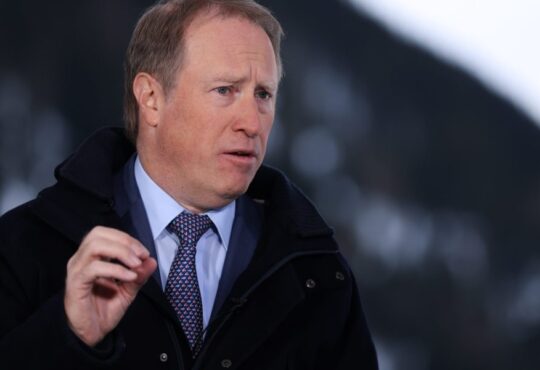
Press play to listen to this article
Voiced by artificial intelligence.
It’s shaping up to be the political bun-fight of the year.
The battle to become the next head of the European Investment Bank is heating up, setting up a clash between two of Europe’s best-known politicians with a background in finance.
Margrethe Vestager, the EU’s outgoing competition chief, and Nadia Calviño, Spain’s finance minister, are vying for the top job at the increasingly important Luxembourg-based lender, which doles out billions of euros in loans to infrastructure projects each year, including rebuilding work in Ukraine.
Like all EU fights, the political horse-trading doesn’t happen in a vacuum. Behind the scenes, finance ministers are already making calculations about how the EIB contest filters into the big carve-up of the EU jobs pie next year, when new commissioners will be appointed after the European election in June.
France’s position is likely to prove particularly significant. Paris has long been frustrated with Vestager, who took a position against “European champions” by blocking the planned rail mega-merger between Alstom and Siemens. In the race for the EIB, France is also stressing that the next EIB boss should steer the lenders’ resources into nuclear projects — something that is seen as likely to play in Calviño’s favor.
European finance ministers will huddle next month in the northern Spanish city of Santiago de Compostela to pick the candidate — under EIB rules, the decision falls to the bank’s board of governors, aka European finance ministers.
Vestager’s gamble
Two months ago, the prospects looked better for Margrethe Vestager. The competition chief, approaching the end of her second term as commissioner, announced a surprise run for the EIB job.
The 55-year-old Vestager has been one of the most recognizable figures in the EU for the better part of a decade, championing a tough stance on Big Tech and the tax arrangements of multinationals that earned her the dubious honor of being name-checked by former President Donald Trump as the “tax lady.” However, her star has faded significantly in her second term, as critics complained that her much-trumpeted cases against Google did little to rein in the search giant’s dominance, and she suffered a major defeat in 2020 over her €13 billion case against Apple’s tax affairs in Ireland.
Still, regardless of those setbacks, the EIB looked like an ideal landing zone for the former Danish deputy prime minister to bounce back.
The 11th-hour bid by Nadia Calviño has changed the dynamic, however. The Spaniard is a former European Commission official who was director general of DG BUDG and has been Spanish finance minister since 2018. She has made her top-job ambitions known before, making an unsuccessful bid for the presidency of the Eurogroup, the body representing euro finance ministers, in 2020.
She has also been rumored to have ambitions to secure a top global job, at the IMF or World Bank, speculation fueled by her appointment as chair of the International Monetary and Financial Committee, an advisory body within the IMF.
Piecing the jigsaw together
Vestager and Calviño are not the only possible runners. Others in the mix are Polish economist and current EIB Vice President Teresa Czerwińska, Sweden’s Thomas Östros, and former Italian minister and Deputy Governor of the Bank of Italy Daniele Franco.
Officials who spoke to POLITICO believe the job is Calviño’s to lose, noting that she already has an inbuilt advantage because she sits around the Ecofin table.
“This is largely a decision for finance ministers. If you’re a current finance minister you have the advantage,” said one European official.
But the role of the EU’s four biggest countries is also crucial. Contacts have been underway for weeks between officials in some of Europe’s top economies. French Finance Minister Bruno Le Maire spoke to Vestager last month following the furor over the nomination of American economist Fiona Scott Morton to a top competition post, a move vehemently opposed (and ultimately scotched) by Paris.
France has been upfront about what it sees as a key priority for the EIB — allowing the lender to invest in nuclear projects, a policy currently prohibited by the bank. Le Maire told the National Assembly on July 12 that the next head of the EIB should support nuclear.
Officials declined to comment on whether Le Maire and Vestager discussed the inclusion of nuclear during their phone call on July 25. But a senior French official conceded that Vestager’s previous opposition to nuclear energy has been noted.
“She [Vestager] did everything she could to remove nuclear power from Repower EU [the EU’s recent energy proposal] so she did not exactly win our confidence there. But most importantly, we have some differences of vision on industrial policy,” the official told POLITICO.
Another official suggested that Vestager knows that Calviño’s entry into the race could sound the death knell for her candidacy, particularly when it comes to French support. “Paris has always made it clear that Vestager was by far the best candidate — as long as Calviño didn’t declare herself. So there’s no real surprise here; no naiveté.”
Asked about Macron’s views on the dilemma between Calviño and Vestager, two sources said the French president had not made up his mind yet.
Two is too many
But Calviño also has a battle on her hands. Another Spaniard, Deputy Governor of the Bank of Spain Margarita Delgado, is in the running for the chair of the ECB’s supervisory board. The post of Single Supervisory Mechanism (SSM) chair — a big deal in the world of European finance — falls vacant at the end of the year. But member countries are unlikely to agree to two Spaniards securing top financial jobs. Also on the SSM shortlist is German economist and Bundesbank Vice President Claudia Buch, with Berlin making a big push behind the scenes for her candidacy.
Buch’s candidacy is complicated by the fact that the European Parliament’s economic committee threw its weight behind Delgado at a hearing of candidates earlier this year and is likely to balk at the idea of any behind-the-scenes efforts to install the German. (The European Parliament, as well as the Council, will have to approve the nomination.)
Italy also has skin in the game. Though it nominated Daniele Franco, a close ally of respected former Prime Minister and ECB chief Mario Draghi, for the EIB job, sources have said that Rome is in fact instead preparing to propose the former economy minister as a replacement for Fabio Panetta, who will shortly step down from the ECB executive board. A spokesperson for the Italian economy ministry declined to comment.
With negotiations stepping up ahead of next month’s gathering in Santiago de Compostela, the coming tussle over who will head the EIB is a taste of what’s to come next year, when the real battle over who runs the EU will unfold following the European election.
Giovanna Faggionato and Clea Caulcutt contributed reporting.






